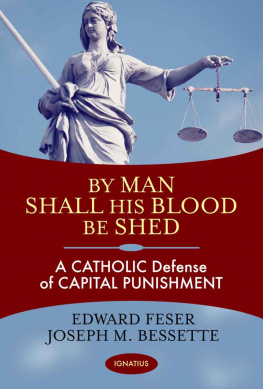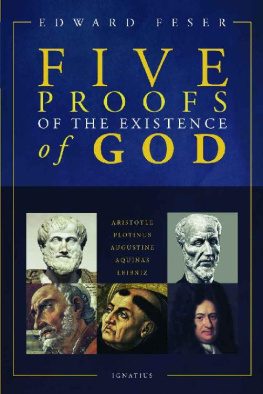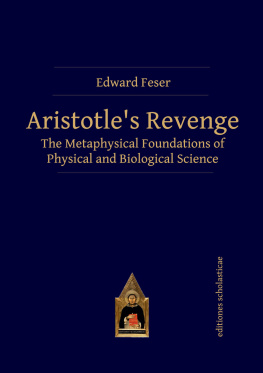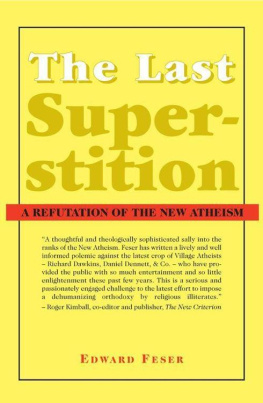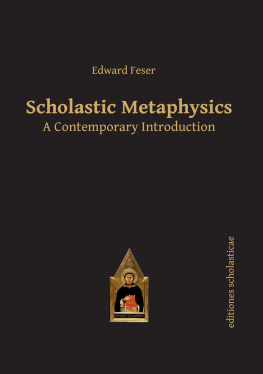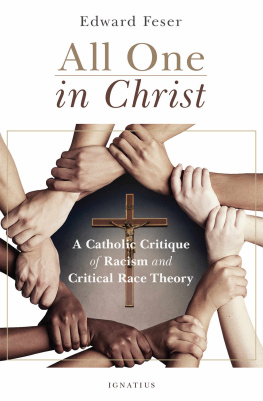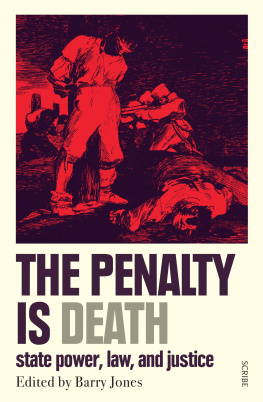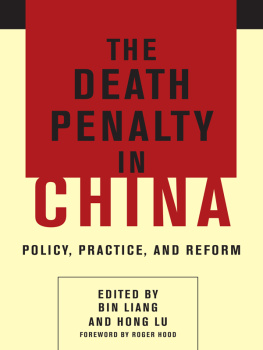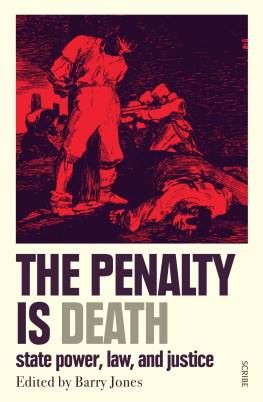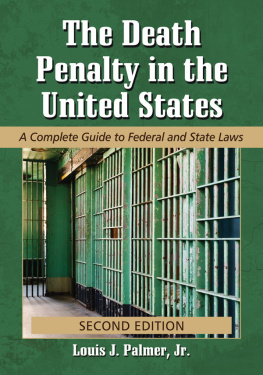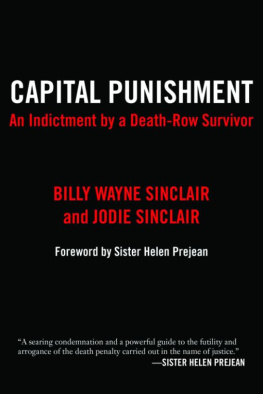BY MAN SHALL HIS BLOOD BE SHED
EDWARD FESER
JOSEPH M. BESSETTE
By Man Shall His
Blood Be Shed
A Catholic Defense of Capital Punishment
IGNATIUS PRESS SAN FRANCISCO
Unless otherwise noted, Scripture quotations (except those within citations) have been taken from the Revised Standard Version of the Holy Bible, Second Catholic Edition, 2006 by the Division of Christian Education of the National Council of the Churches of Christ in the United States of America. All rights reserved.
Excerpts from the Catechism of the Catholic Church , second edition, 2000 by Libreria Editrice Vaticana-United States Conference of Catholic Bishops, Washington, D.C. All rights reserved. Used with permission.
Quotations from English translations of papal documents are from the Vatican website (w2.vatican.va), Libreria Editrice Vaticana. All rights reserved. Used with permission.
Cover image:
Lady Justice
Robert Wilson / us.fotolia.com
Cover design by Carl E. Olson
2017 by Ignatius Press, San Francisco
All rights reserved
ISBN 978-1-62164-126-1 (PB)
ISBN 978-1-68149-768-6 (EB)
Library of Congress Control Number 2016934525
Printed in the United States of America
CONTENTS
PREFACE
We launched this project several years ago, not long after we first met. One of us (Feser), trained in philosophy and theology, had defended capital punishment from a Catholic and natural law perspective in several articles. The other (Bessette), trained in political science and with nine years of full-time experience in criminal justice, regularly taught the death-penalty debate in the classroom (mostly from a secular perspective) and was working on a large empirical study of the death penalty in the United States. Both of us strongly supported the death penalty and were deeply troubled by the growing opposition to it among Catholicsand by the ignorance among many Catholics of what the Church has traditionally taught on this subject. We agreed that there was an urgent need for a full-length defense of capital punishment, written from a Catholic point of view, that treated in detail every aspect of the questionphilosophical, theological, and social scientific. A collaboration naturally suggested itself, and the result is this book.
Though we are equal contributors to what follows, Feser was primarily responsible for chapters 1 and 2 and Bessette for chapters 3 and 4. Despite this broad division of labor, each individual chapter benefited from our very close collaboration.
We would like to thank the following individuals who read one or more chapters of the draft and provided helpful comments, insights, suggestions, and corrections: Barry Latzer, Steven Long, Fr. Gerald Murray, and Edward Peters. We also thank the tutors of Thomas Aquinas College in Santa Paula, California, for their feedback during a presentation on our project given at the college during the summer of 2013 and the participants at two workshops on criminal justice and capital punishment hosted by the Salvatori Center at Claremont McKenna College in 2013. Any errors of fact or interpretation remain our sole responsibility.
Feser would also like to thank David Oderberg, for the insights he offered during a long discussion of the traditional natural law defense of capital punishment; Christopher Tollefsen, for the vigorous criticisms he has put forward during several public exchanges with Feser on the subject of capital punishment; and audience members at a lecture Feser gave on the natural law case for capital punishment in the spring of 2013 at the California State University at San Bernardino.
Bessette would like to thank the students at Claremont McKenna College for their insights in his crime class for the past twenty-five years; the dedicated staff at the Bureau of Justice Statistics, where Bessette worked as deputy director and acting director from 1985 to 1990, who have been compiling data on capital punishment for half a century; and the felony prosecutors in the Cook County, Illinois, States Attorneys Office from whom he learned the realities of murder and its punishment in the United States while serving on States Attorney Richard M. Daleys staff from 1981 to 1984. He also thanks his friend and colleague Eric Helland for reviewing some of the data and interpretations of chapter 4, and he gratefully acknowledges the research assistance of Jennifer Lee, a student at Scripps College, Dan Carpenter, then a student at the Claremont Graduate University, and Hugh ODonnell of St. Monica Academy in Montrose, California.
INTRODUCTION
Whoever sheds the blood of man, by man shall his blood be shed; for God made man in his own image .Genesis 9:6 If a Catholic were to be at odds with the Holy Father on the application of capital punishment... he would not for that reason be considered unworthy to present himself to receive Holy Communion. While the Church exhorts civil authorities... to exercise discretion and mercy in imposing punishment on criminals, it may still be permissible... to have recourse to capital punishment. There may be a legitimate diversity of opinion even among Catholics about... applying the death penalty .Cardinal Joseph Ratzinger,
Worthiness to Receive Holy Communion:
General Principles (2004)
Between 1796 and 1865, Giovanni Battista Bugatti executed 516 condemned criminals, more than four-fifths for murder. Some of them were hanged, some guillotined, some decapitated with an ax. In the case of especially heinous crimes, the methods of execution were harsher. Some criminals had their heads crushed with a mallet, after which their throats were cut. Some were drawn and quartered.
Who was Bugatti? He was the official executioner of the Papal States, a devout Catholic who carried out his work as a loyal servant of the Holy Father.
Many contemporary Catholic readers will find all of this surprising. They are used to hearing churchmenincluding popes, most famously Pope John Paul IIcall for the abolition of the death penalty; and they are used to hearing this abolitionist position defended precisely on moral and theological grounds. Capital punishment, they are told, does not sit well with mans dignity as a creature made in Gods image. Yet Pius IX and his many predecessors who authorized executions in the Papal States were no less Catholic, no less devout, no less infallible than John Paul II. Moreover, in defense of capital punishment Pius IX could call upon a vast wealth of arguments that no faithful Catholic can take lightlyarguments from natural law, from Scripture, from the Fathers and Doctors of the Church, and from the consistent teaching of previous popes. For example, he could appeal to Genesis 9:6, quoted above, which sanctions the execution of murderers precisely in the name of the victims dignity as a creature made in Gods image . He could also appeal to the fact that previous popes taught that Catholics must, on pain of heterodoxy , acknowledge that the state has a right to inflict capital punishment on those guilty of grave offenses. So what is going on here?
What is going on, as we will demonstrate in this book, is that capital punishment is, and in the nature of the case must always be, an issue about which faithful Catholics may, within certain limits, legitimately disagree. The Church has certainly never taught that the state must in all cases execute those guilty of the most serious crimes. She has never insisted on applying the death penalty. But she has with equal certainty always taught that the state may in some cases legitimately execute those guilty of the most serious crimes. She has insisted that no Catholic is permitted to deny that the state has this right, at least in principle. On the question of whether resort to capital punishment is in practice appropriate under specific, concrete historical and cultural circumstances, she has left things to the free discussion of Catholics, and different attitudes have tended to prevail at different times. For most of the history of the Church, from about the fourth century until the 1970s, the attitude of churchmen and other Catholics toward the use of capital punishment tended to be positive. In the earliest centuries of Christian history, when the Church was subject to severe persecution by the state, the attitude of churchmen and other Catholics toward the use of capital punishment tended to be more negative, as it has in more recent decades.
Next page
